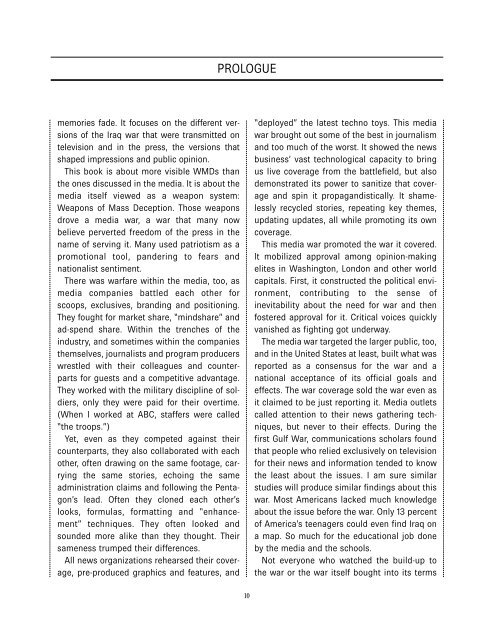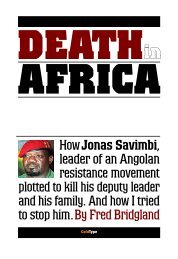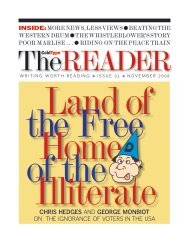UPDATED - ColdType
UPDATED - ColdType
UPDATED - ColdType
- TAGS
- updated
- coldtype
- coldtype.net
Create successful ePaper yourself
Turn your PDF publications into a flip-book with our unique Google optimized e-Paper software.
memories fade. It focuses on the different versions<br />
of the Iraq war that were transmitted on<br />
television and in the press, the versions that<br />
shaped impressions and public opinion.<br />
This book is about more visible WMDs than<br />
the ones discussed in the media. It is about the<br />
media itself viewed as a weapon system:<br />
Weapons of Mass Deception. Those weapons<br />
drove a media war, a war that many now<br />
believe perverted freedom of the press in the<br />
name of serving it. Many used patriotism as a<br />
promotional tool, pandering to fears and<br />
nationalist sentiment.<br />
There was warfare within the media, too, as<br />
media companies battled each other for<br />
scoops, exclusives, branding and positioning.<br />
They fought for market share, “mindshare” and<br />
ad-spend share. Within the trenches of the<br />
industry, and sometimes within the companies<br />
themselves, journalists and program producers<br />
wrestled with their colleagues and counterparts<br />
for guests and a competitive advantage.<br />
They worked with the military discipline of soldiers,<br />
only they were paid for their overtime.<br />
(When I worked at ABC, staffers were called<br />
“the troops.”)<br />
Yet, even as they competed against their<br />
counterparts, they also collaborated with each<br />
other, often drawing on the same footage, carrying<br />
the same stories, echoing the same<br />
administration claims and following the Pentagon’s<br />
lead. Often they cloned each other’s<br />
looks, formulas, formatting and “enhancement”<br />
techniques. They often looked and<br />
sounded more alike than they thought. Their<br />
sameness trumped their differences.<br />
All news organizations rehearsed their coverage,<br />
pre-produced graphics and features, and<br />
PROLOGUE<br />
10<br />
“deployed” the latest techno toys. This media<br />
war brought out some of the best in journalism<br />
and too much of the worst. It showed the news<br />
business’ vast technological capacity to bring<br />
us live coverage from the battlefield, but also<br />
demonstrated its power to sanitize that coverage<br />
and spin it propagandistically. It shamelessly<br />
recycled stories, repeating key themes,<br />
updating updates, all while promoting its own<br />
coverage.<br />
This media war promoted the war it covered.<br />
It mobilized approval among opinion-making<br />
elites in Washington, London and other world<br />
capitals. First, it constructed the political environment,<br />
contributing to the sense of<br />
inevitability about the need for war and then<br />
fostered approval for it. Critical voices quickly<br />
vanished as fighting got underway.<br />
The media war targeted the larger public, too,<br />
and in the United States at least, built what was<br />
reported as a consensus for the war and a<br />
national acceptance of its official goals and<br />
effects. The war coverage sold the war even as<br />
it claimed to be just reporting it. Media outlets<br />
called attention to their news gathering techniques,<br />
but never to their effects. During the<br />
first Gulf War, communications scholars found<br />
that people who relied exclusively on television<br />
for their news and information tended to know<br />
the least about the issues. I am sure similar<br />
studies will produce similar findings about this<br />
war. Most Americans lacked much knowledge<br />
about the issue before the war. Only 13 percent<br />
of America’s teenagers could even find Iraq on<br />
a map. So much for the educational job done<br />
by the media and the schools.<br />
Not everyone who watched the build-up to<br />
the war or the war itself bought into its terms

















